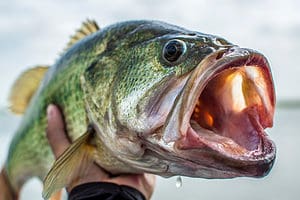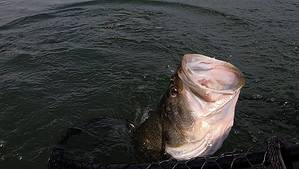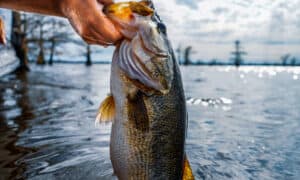Black bass are the most popular freshwater game fish in North America. There are 13 species of black bass, including largemouth bass, smallmouth bass, and spotted bass (often known as Kentucky bass). The largemouth is the largest of all the black bass species, and the biggest largemouth bass ever caught was a jaw-dropping monstrosity. The world-record largemouth bass weighed a whopping 22 pounds, 4 ounces! Actually, the largemouth bass world record is a rarity. There is currently a tie for the record. But how did these fish grow so large?
George Perry
George Perry landed the original record fish on June 2, 1932, while fishing in southern Georgia’s Montgomery Lake. The lake is an oxbow off of the Ocmulgee River. There is a Georgia historical marker in place today to commemorate his catch.
The tale of this epic fish has been handed down for generations. As the story goes, Perry, who was 20 years old at the time, was fishing with a friend, Jack Page. They had planned to work in their farm fields that day, but recent rains made that impossible, so they opted for a day of fishing instead. This was not a pleasure trip, though. This fishing trip was an outing intended to put food on the table.
Many bass fishers today are strictly catch-and-release anglers. However, we have to remember the historical context. This was 1932, and the Great Depression was raging. Farmers like Perry didn’t have the luxury of spending a day relaxing on the lake and releasing whatever they caught. With families depending on them, every food source was precious. In Perry’s case, he was working to help support a family of six while in the throes of the Depression. Any bass that Perry and his buddy caught that day were destined for the frying pan, including the world-record largemouth that Perry reeled in.
Catching the Record Fish
The two friends had a homemade wooden boat. They also had one fishing rod and one lure between them. One of them would fish while the other manned the boat’s oars.

Perry caught his bass in Montgomery Lake, which is an oxbow off of the Ocmulgee River seen here.
©iStock.com/annbertschin
Perry was fishing with their rod when he felt a massive strike on the other end of the line. Years later, Perry recounted the experience in an article in a 1969 edition of Sports Afield magazine. He said, “I don’t remember many of the details but all at once, the water splashed everywhere. I do remember striking, then raring back and trying to reel. But nothing budged. I thought for sure I had lost the fish — that he’d dived and hung me up. I had no idea how big the fish was, but that didn’t matter. What had me worried was losing the lure.”
Remember, this was the only lure the two fishermen had. Losing it would have meant their opportunity to secure food that day was gone. The lure was not hung up, though. Instead, Perry hauled that gigantic largemouth into the boat. Perry said, “The first thing I thought of was how nice a chunk of meat [this would be] to take home.”
Before the fish was filleted, Perry took it to the local post office, where it was weighed on the postal scale. The weight registered 22 pounds, 4 ounces. For many years, a picture of the bass was not known to exist. We do have a verified picture of the fish today, as seen in this tweet from Bass Fishing Facts.
A Record Catch Before Records Were Kept
Perry caught this bass seven years before the International Game Fish Association (IGFA) was founded. This organization is the official keeper of fishing world records today. IGFA grandfathered Perry’s bass into its record books. It stood as the biggest largemouth ever documented until 2009.
Manabu Kurita
On July 2, 2009, Manabu Kurita caught a largemouth that seemed like it could challenge Perry’s fish for the world record.
Kurita was fishing on Lake Biwa. The lake is located in Shiga Prefecture, northeast of Kyoto, Japan. At the time of his catch, Kurita was a 32-year-old professional fishing guide.

Kurita caught his mammoth bass on Lake Biwa.
©beeboys/Shutterstock.com
Interestingly, bass are not native to Japan. The fish were stocked in Japanese lakes and rivers beginning in 1925. Bass have thrived in some of these waters, but none more than Lake Biwa.
Kurita was using a live bluegill (another non-native fish) as bait when he set the hook on this lunker largemouth. The official weight of Kurita’s fish was 22 pounds, 4.97 ounces. His catch bested Perry’s legendary largemouth by almost one ounce. However, since IGFA rules state a new record fish must beat the old record by at least two ounces, Kurita’s fish is officially listed in the record book as a tie with Perry’s bass at 22 pounds, 4 ounces.
Unlike Perry’s bass, we do have high-quality pictures of Kurita’s fish. Wonder what a 22-pound largemouth bass looks like? Wonder no more.
How Do Largemouth Bass Reach Record Size?
The average size of a largemouth bass is one to five pounds. A trophy largemouth is often considered a bass larger than eight pounds, though anglers will debate what actually constitutes a trophy fish. There is no debate, though, that a 22-pound largemouth is just absurd. How can these fish possibly grow to such immense size? A few factors must be present. Here are three of the most important ones.
1. Food
The bass must have a consistent and abundant food source. In Montgomery Lake, where Perry landed his behemoth, bass can feed on large populations of panfish, such as bluegill. The bass that were stocked in Lake Biwa, where Kurita caught his massive largemouth, found the native carp of the lake to be a perfect food to help them grow to ridiculous sizes.
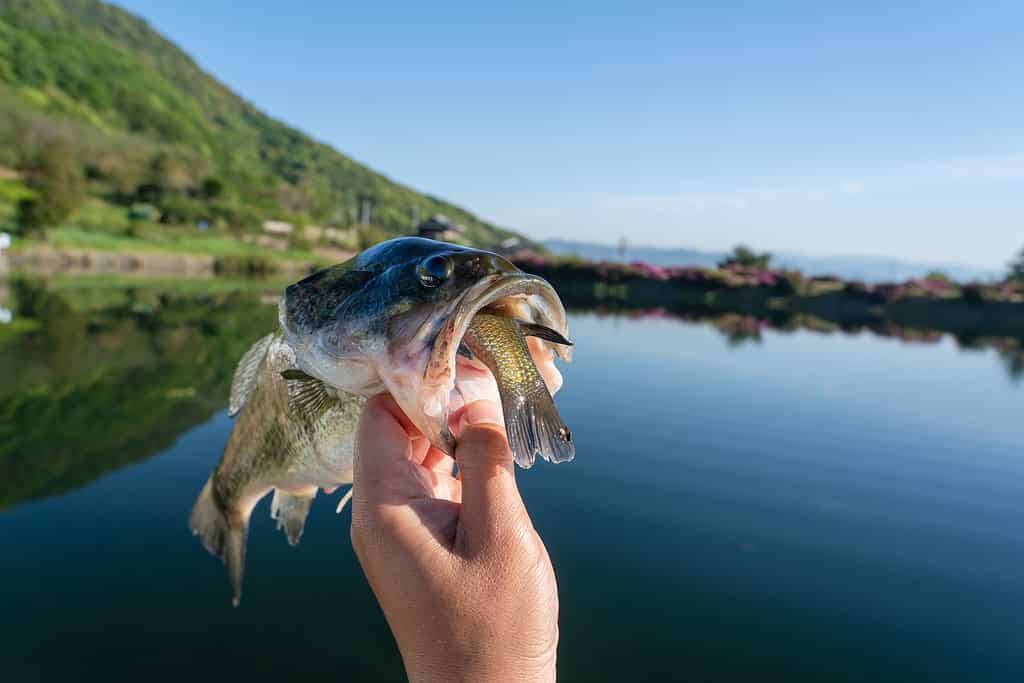
Bass need a consistent food source to grow large, and bluegill are often their prey of choice.
©iStock.com/SAND555
2. Climate
The climate must be right to allow the fish to grow to such prodigious sizes. Even a cursory glance at the different world-record classes for largemouth bass reveals an obvious trend: these fish were all caught in warm weather environments. Many came from southern California. A few were caught in Florida and Georgia. And then there is Kurita’s bass, which was caught in a temperate region of Japan where the average high temperature in January is close to 50°F. Warm weather throughout the year means bass never enter a torpor state as they do in colder regions. Instead, they can feed year-round. This doesn’t mean big bass aren’t swimming in more northerly waters, but it is doubtful that a world-record fish will be caught there. Colder climates just aren’t conducive to growing gigantic bass.
3. Subspecies
There are two subspecies of largemouth bass. In most circumstances, Florida largemouth bass (Micropterus salmoides floridanus) and northern largemouth bass (Micropterus s. salmoides) grow to roughly the same size, with the Florida subspecies having only a slight edge in length and weight. But, while the two subspecies typically grow to similar sizes, only Florida largemouths have the potential to grow into these ridiculous record-setters if the conditions are right. This is why Florida largemouth bass have been stocked in many parts of the world, including Japan. Kurita’s fish was a Florida largemouth. Experts suspect Perry’s was, as well. If the world record for largemouth bass is ever broken, you can bet a Florida largemouth will do it.
Fishing’s Most Sought-After Prize
There is no other fishing record in the world more sought-after than the world-record largemouth bass. Professional anglers have long tried to break Perry’s record. They fish from $100,000+ bass boats outfitted with more technology than NASA used to land a man on the moon. And yet, George Perry’s name is still in the record book…the Depression-era Georgia farmer who fished from a homemade boat and only had one lure to his name. His record has officially been tied, but his name is still there. Will his record ever be broken? Possibly. But in the meantime, there is something that just seems right about a poor farm boy out fishing millionaire professionals. It reminds us that anyone with a fishing rod, even if it is the only one they own, has the potential to catch something special every time they hit the water.
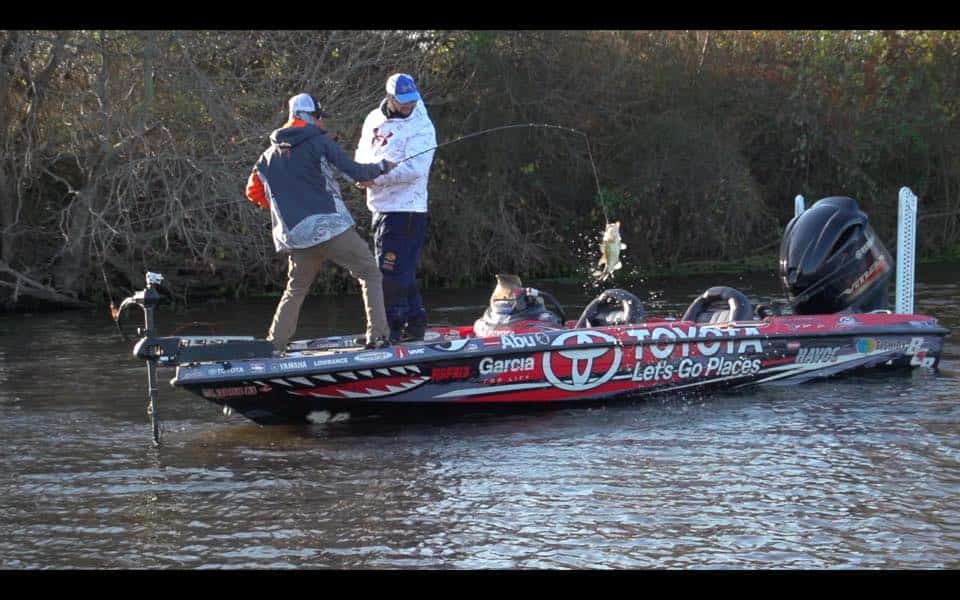
Professional anglers continue to chase Perry’s record.
©Jkbigbass / CC BY-SA 4.0 – License
The photo featured at the top of this post is © iStock.com/Mr Bass Outdoors
Thank you for reading! Have some feedback for us? Contact the AZ Animals editorial team.



